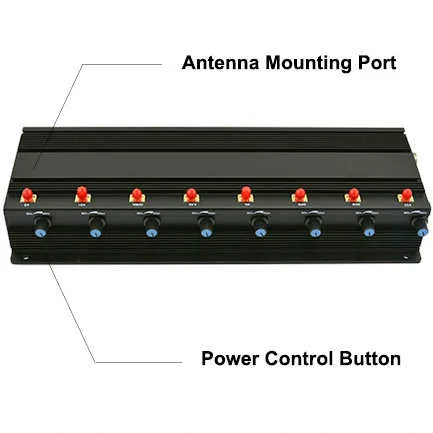The military and prison institutions have the right to own and use jammers
What is a radio jammer?
A jammer is a radio transmitter designed to interfere with, destroy, or block radio communication signals or services. In general, its role is to transmit a stronger signal than a useful signal on the target frequency band. Then the receiver no longer detects a useful signal.
Jammers often have a wider radius of action than people think or sellers suggest.
And, users are often overwhelmed by the range of devices, which are never limited to small Spaces, such as rooms or vehicles!
For example, a jammer used in a classroom to prevent students from using laptops could interfere with mobile phones in an entire community! Similarly, gps blocker used by employees who want to stop being geolocated by their employers may interfere with aircraft flying at 2,000 m or parked at 500 m. The use of jammers constitutes intentional and aggressive interference with the radio spectrum.

There are many types of jammers, depending on whether or not they can interfere:
Mobile phone and Internet: GSM, UMTS, LTE;
Other wireless transmission networks: wifi blocker, wireless LAN RLAN, WiMax;
Applications such as receiving geo-positioning signals from satellites (GPS, Galileo...) Cameras or wireless alarms...
A radio jammer usually takes the form of an electronic box with one or more small antennas, depending on the number of frequency bands it can interfere with. In the latter case, it is called multiband.
Telephone jammers: What are the applicable regulations?
The mention of the school phone ban at the start of the 2017 school year, and a few miscellaneous incidents such as GPS jammers blocking Nantes airport last April alerted us to the existence of these devices, making the rendering possible. Electronic communication equipment failed. If these materials exist, who can decide to implement them? Updates to applicable legislation.
Prohibition principle
Article L33-3-1 of the Postal and Electronic Communications Act prohibits the installation, possession and use of any equipment designed to render all types of electronic communications equipment incapable of transmission and reception.
Failure to comply with this ban is punishable by six months 'imprisonment and a fine of €30,000 (Article L39-1 of the Postal and Electronic Communications Act).
Immunity from sovereign prerogatives
Article L33-3 (2) of the Postal and Electronic Communications Act provides for derogations "for the purposes of public order, defence and national security or public judicial service".
As a result, France, the army, the General Directorate of External Security, and prison agencies are all authorized to possess and use jammers. According to a report by the National Assembly, deliberate interference is a sovereign prerogative.
The school has no plans for an extension
Installing "radio jammers" in schools has been proposed in a bid to crack down on the inappropriate use of mobile phone jammer during school hours. The State Administration of Education has reflected on the issue. It stresses that such devices are not selective, that it would also involve teachers, and that in the event of an emergency (attack, etc.), it would limit communication with the outside world.
From a strictly legal point of view, the 2012 ministerial response recalls the prohibition of Article L.33-3-1 of the Postal and Electronic Communications Act and the fact that such use is permitted by way of derogation "for the needs of the public." Order, defence and national security, or judicial public service ". They are not allowed to be used in schools because they are not mentioned in the Restricted Derogation list.
Specific and time-limited exemptions for performance halls
The 2011 Act introducing the ban came into force on 1 February 2012. However, according to Article 57 of the Act, radio installations installed in performance halls can render all types of mobile phones inoperable (transmission and reception). The date of publication of the decree may be retained for five years. Problems with the use of mobile phones in concert halls emerged in the 1990s, and jamming signal technology was effective for a time. That five-year period, which has now expired, was designed to allow theater owners to unload equipment.
From now on, there are other forms of regulation (messaging, self-regulation, etc.). Moreover, on the contrary, the use of mobile phones must not be prevented, including on these premises, because of terrorist threats.


Comments
Post a Comment